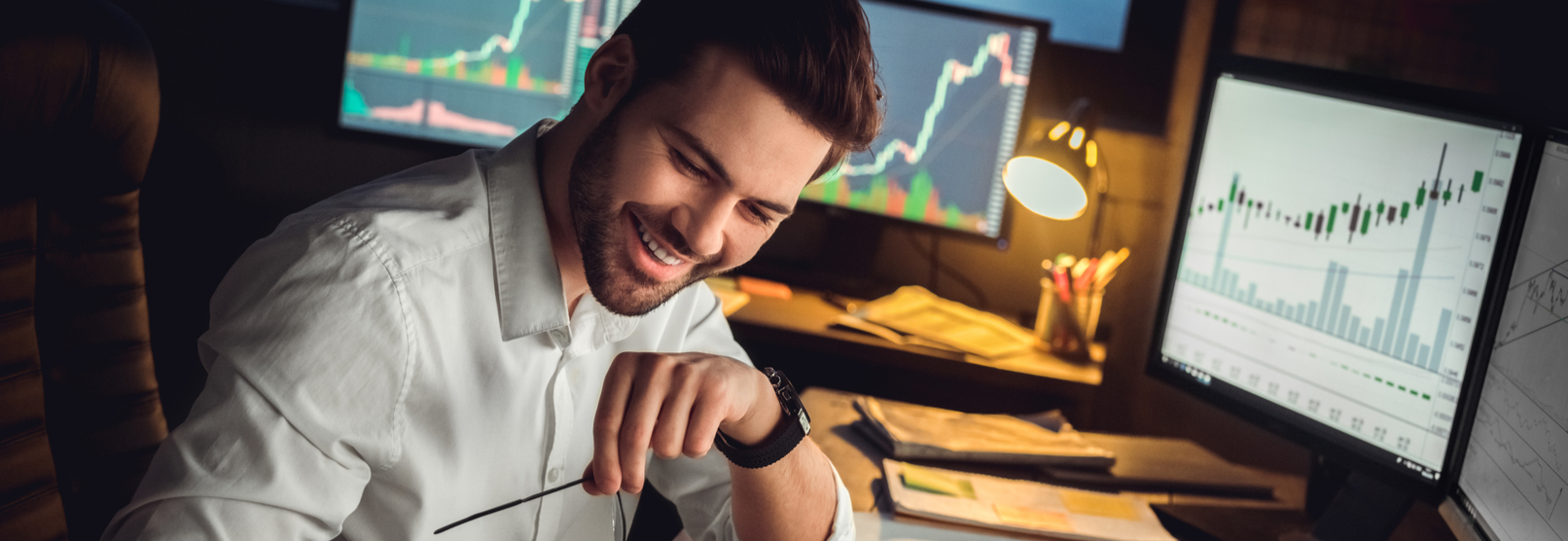
Starting out as a new trader and investor can be both exciting and scary. Read this article to avoid the mistakes most traders tend to make at the beginning of their trading career.

Beginner’s guide to trading and investing in the financial market
There are some costly mistakes that would have us wishing we had a time machine to go back in time and make things right. Unfortunately, there is none. Starting out as a new forex, futures, and stock trader and investor can be both exciting and scary. However, new traders and investors do not have to repeat the mistakes that traders who preceded them make. There is the benefit of learning from the mistakes of others. With a little common sense and humility, there is much wisdom to be learned from our expert traders, and lead students, who have been trading consistently profitable for years.
Do not misunderstand us; We are not saying you will never lose a trade by reading this article. All we are offering is a way to avoid the stupid and unnecessary mistakes most forex, futures, and stock traders and investors tend to make at the beginning of their trading career. Avoiding such mistakes will save you a lot of time, money, and heartache.
Here are some facts you need to master and keep close as you start your trading and investing career:
Learn Supply and Demand as your primary trading strategy, master it and stay with it
Many novice traders enter the market without a trading plan. They enter and exit trades without actually knowing what to watch out for. It’s synonymous to gambling, and they enter forex, futures, and stock trades, hoping everything will turn out well. The first step to becoming a professional trader and investor has to be learning the Supply and Demand trading strategy and mastering it. You don’t just learn the strategy, you master it and stick with it because without that, you’ll never stand a chance in the financial market at all.
Save up capitals in the early stages
Forex, futures and stock traders and investors tend to quickly exhaust their risk capital in the early days of trading and investing without considering capital conservation. The sad truth is that during your early days, you are going to learn a lot of hard lessons. If you end up exhausting all your capital while learning those lessons, you won’t have anything actually to trade and invest with when you finally know what to do. You need to survive long enough to be able to apply all you learn. You can’t afford to be all burnt out before you reach that expert trader status.
Most people think trading and investing is for the extremely intelligent and rich, which isn’t true. However, you would still have to overcome specific difficulties in the early stages of your trading and investing career. You must learn how to manage your risk and not be trigger happy. You don’t want to end up being a broke expert trader.
Don’t focus only on one asset class
Don’t just trade one asset class, analyze the market across different asset classes such as forex, futures, and stocks. This gives you more chances of finding investment and trading opportunities and generating profit. At our online trading academy, we always ensure to cover all asset classes, ranging from all forex pairs to major equity indices and a wide range of commodities, precious metals, and energies. We also go as far as researching prospective lucrative investments in different companies. The primary thing is always to keep your mind open, never limit your options. We are not asking you to consider every single market available out there. What we do is pick the different markets that are our favorite and that we have had great opportunities in overtime, and we stick to those markets.
Focus on how well you are performing as a trader and investor, not on the money
Quite a number of forex, futures, and stock traders and investors focus solely on their trading balance, and they automatically expect it only to rise, but once there is a drop in their account, they begin to panic. The simple truth is that this obsessive behavior might be the cause of so many trading failures and disasters. When you get overly focused on the money in your account and not the overall performance of your account, you might be wondering what the difference is, but those are two very different things.
To check your trading account performance, you have to look at your average risk to reward ratio in conjunction with your winning rate. The moment you shift your focus from the dollar value of your account to these two Key Performance Indicators (KPIs), you naturally start being a better trader.
These two KPIs don’t just reflect the wellbeing of your trading account; it also goes a long way to expose your weaknesses and strengths. Once the average risk to reward ratio of a person is consistently above 1:2, it points to an individual who is well disciplined, organized, and focused. It tells the kind of trader and investor you are just as it points to the sort of person you also are. You should always stay accountable to your KPIs rather than your account’s dollar value. You need to take your KPIs seriously and view it as an extension of yourself. If you ever notice your average risk to reward ratio is taking a nosedive and falling drastically, then you have to look inward and address whatever might be wrong with your trading strategy or your mindset.
One way to ensure you consistently focus on your KPIs is to bear it in mind that there is no way you will make a substantial amount of money in the market in a short period. There is no fast money in the financial market, and it would be safer for you to keep that in mind and focus on slowly but steadily improve your KPIs. If you want to know more about these two KPIs, please read this article HERE
Don’t be a dick for a tick
One of the most useful advice you’ll ever get in forex, futures, and stock trading and investing is to avoid greed. You do not need to squeeze out every pip or point from a trade. If your trade is up, and according to your trading plan you have to take profit, but you refuse to take your profit because you are waiting for more, then you are just merely greedy, and that might be your undoing. The market has the capacity to fall as quickly as it rose, so be sure always to exit a trade when your predetermined profit is reached. You do not want your winning trade to end up a losing trade.
You do not need indicators plotted all over your charts
There are many advantages attached to present-day trading, but there are also quite several disadvantages as well. The availability of so many trading software and applications can sometimes be extremely confusing, especially for a novice trader. So many so-called gurus and professionals are trying to teach you their fancy trading strategies, but the question is, how do you know who is lying and who isn’t.
The simple fact is that the mechanics involved in trading and investing in the financial market are not that complex. Once you know how to time the market using Supply and Demand, all you need to do is know how to read and understand the institutional footprints on the charts to let your profits run. There is no magic indicator out there, and we speak from a place of experience because we have tried different ones in our early days of trading.
Be okay with being out of a position
Here is something that might come as a surprise to you, being out of a position has so many advantages, and a lot of professionals know this but hardly talk about it. Brokers want you to be consistently in the market with as many positions as possible, but that is only in their best interest, not yours. The sure way to make money consistently from the market is by low-frequency trading and investing, which means the broker will make less money off you.
When most of us started trading the financial market, it was incredibly difficult not to be in a position, and as soon as we close one trade, we always enter another one. It is a general issue for most novice traders, but discipline must be practiced for you to become consistently profitable.
Let’s give you an instance: Assuming you enter a trade early in the month. After about one week your account goes up by 10%, at that point you have two options: Enter another trade right away or practice patience and wait. If you keep entering trades, you might end up with a negative instead of your initial 10%. However, if you wait and you probably didn’t trade for one or two weeks, you still have your 10% intact at the end of the month.
You should always treat the market as a dangerous place. A place you can make profit, and also a place where you should not risk your money except you have every reason to do so.
Do not get obsessed with trading the financial market
You should never make trading your only source of income because that will lead to an obsession of needing it to work out instead of it being an option you know you can survive without. You ought to have slower but long-term investments, some cash savings, and even your job income, alongside trading. Never look at trading as your single source of livelihood because then there is a higher percentage of it not working out.
There are sad stories of beginners quitting their jobs to focus on trading as soon as they fund their live trading account. This is a ridiculous move. You should always have that consistent regular income infrequently coming, especially if you’re speculating in the financial market. It is not just only to pay your bills but to also be able to keep a sound and calm mind, of which you need if you want to have a chance at winning long-term in the markets.
Focus on trading what is moving
All trades need volatility to even have a chance at moving, and one major mistake traders make while trading the forex, futures, and stock market are trading low volatile trades. You will not be able to make money without volatility in your trades. When you do not look for trades with strong or anticipatory trends and obvious Supply and Demand imbalances, you end up watching your money get chummed away. When you eventually get a loss or a tiny win, it can cause so much frustration which could have been avoided.
Stick to trading higher timeframes
Here is a piece of advice most of us wish we got earlier in our trading and investing career. Trading higher timeframes will save you so much time, money, and headache. You need to avoid low timeframes and short-term trading if you want to be successful in the long run. If you have been with us for a while now, you probably already know why we always advise our students to trade only higher timeframes and focus on daily, weekly, and monthly charts. These charts help erase the distractions and noise caused by the shorter timeframes.
Conclusion
Unfortunately, time machines are yet to be invented, and we all get to live with our mistakes. However, the excellent news is that you can learn from the mistakes of others and master how to avoid them. It will save you thousands of dollars, time, and help you navigate more naturally. Our expert traders are consistently profitable traders and investors. However, the fact is they have been in your shoes and have been able to make it to the other side.
The facts discussed above will help your trading and investing success and save you countless dollars and many sleepless nights. Most mistakes forex, futures, and stock traders and investors usually make, are very predictable because as humans, we all have a behavioral pattern when trading the financial market. Most of the things discussed above are things our expert traders learned through mistakes. If you want to succeed in the financial market, you have to be willing to invest the time to learn what works.
At our online trading academy, we focus on giving new forex, futures, and stock traders and investors the support needed to succeed and the right training as well for the rest of their life.
If you want to learn more about professional trading and investing across multiple asset classes such as forex, futures, and stocks, please sign up HERE for free at our online trading academy www.onlinetradingcampus.com and get access to a free three-hour introductory course.
Happy trading!
Author Bio: Bernd Skorupinski teaches the undiluted truth about trading and investing at Online Trading Campus and takes you through what it takes to be a consistently successful trader. His favorite moment as a trading mentor is the way peoples’ eyes light up with excitement and confidence when they understand how Supply and Demand trading strategy works and how it can help win in the trading arena. He believes in building core values and discipline that ensures his students do not succumb to the pressures and temptations of the market. He very much believes in following plans and strategy through. If you want to know more about the author Bernd Skorupinski please read HERE





